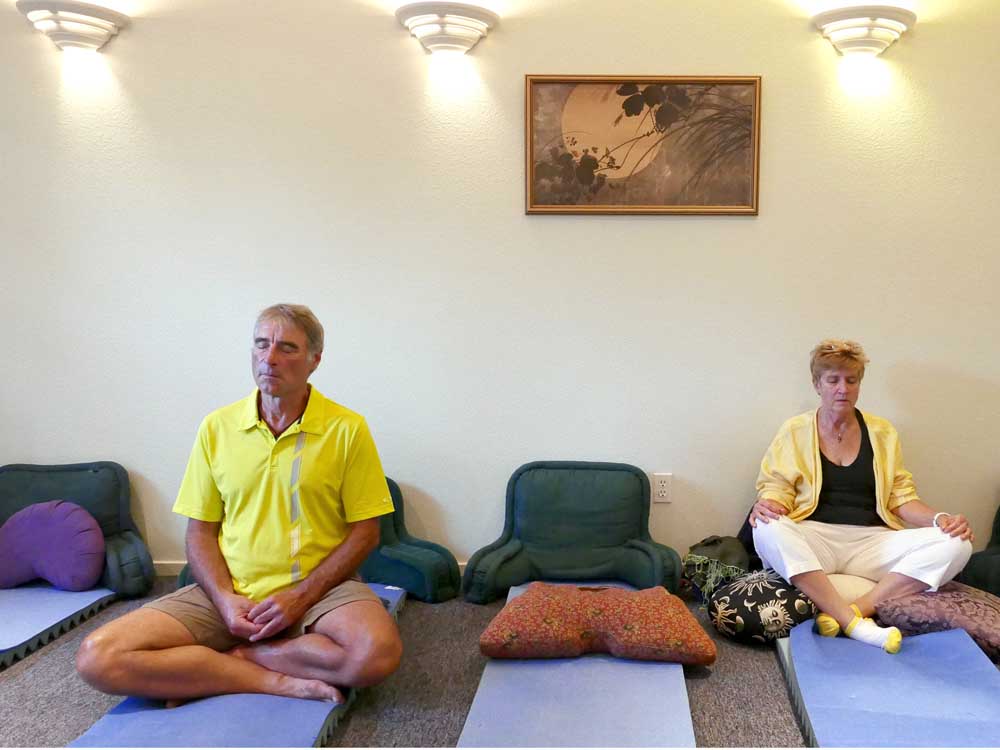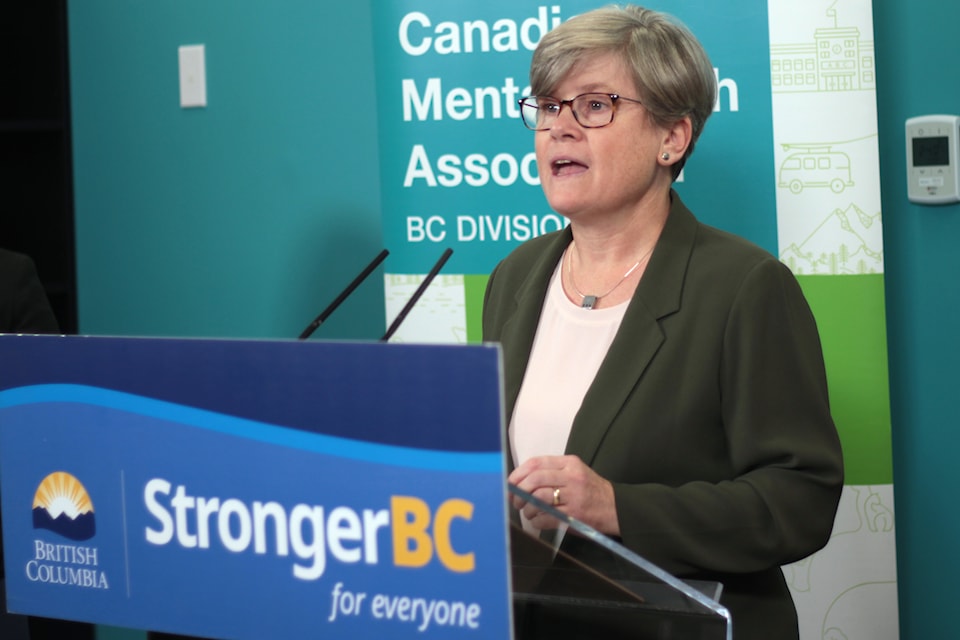Meditation trickles down to ‘regular’ people
Published 12:00 am Thursday, August 20, 2015

- Joe Kline / The BulletinKevin Meyer, left, and Kathi Antolak, both of Bend, sit during a group meditation session in a space near licensed psychologist Ray Gertlerís office on Tuesday evening in Bend.
When Kevin Meyer picked up Transcendental Meditation in 1971, the practice was sweeping college campuses. The Beatles had made a pilgrimage to India a few years earlier, so meditation was cool, but it also required some pretty big life changes.
“It was a struggle because you couldn’t drink or smoke pot for 30 days before the training,” Meyer said. In that way, he said, meditation was like a “counter-culture to the counter-culture.”
Meyer, 63, has been meditating off and on since his days at the University of Wisconsin-Madison, mainly because of the calming effect it has on his everyday life. Meditating first thing in the morning helps him feel more rested after a fitful night of sleep, he said, and it leads to more productive days.
“Proceeding at a mindful pace makes more time, curiously,” he said.
These days one is likely to hear about meditation and mindfulness as antidotes to health problems such as depression, anxiety and chronic pain.
A study published earlier this month in the Journal of the American Medical Association suggests that veterans experiencing post-traumatic stress disorder could benefit from a form of meditation called Mindfulness Based Stress Reduction. At the same time, and perhaps fueled by researchers’ interest, meditation and mindfulness are taking a prominent place in popular culture such as diets based on mindful eating habits and mindfulness training for corporate executives.
With such wide applicability, it’s easy for mindfulness to be construed as a cure-all. In reality, it’s just a coping skill, experts said. “They even refer to it as McMindfulness,” said Ray Gertler, a Bend psychotherapist who has taught an eight-week course on Mindfulness Based Stress Reduction for the past 18 years. “You want to differentiate what really makes sense versus what might be considered vogue.”
Many who participate in Gertler’s course are referred by their doctors because of anxiety, depression and pain, or because they’ve survived a heart attack or cancer, he said.
Mindfulness Based Stress Reduction, developed by Jon Kabat-Zinn in the 1970s, has received a lot of attention from researchers, and more and more studies point to physical changes in the brain, Gertler said. But he added, “You can’t solve a lot of problems in eight weeks.”
Many of the participants realize after taking the course that they need counseling, Gertler said. They might lower their blood pressure but still need medication.
And while meditation seems as effective as drugs for moderate depression, Gertler said, “If a person can’t get out of bed in the morning and isn’t functioning, they’re not going to be able to meditate.” It might even be counter-productive for a depressed person to wade right into meditation. “It is very important to do an assessment,” he said. “If you take someone who’s seriously depressed and teach them meditation, they’re going to ruminate.”
Simple but difficult
Meditators generally learn to quiet their minds and observe thoughts and emotions without passing judgment. They may sit and focus on their breathing, repeat mantras (a hallmark of Transcendental Meditation), or walk slowly. MBSR calls for 45 minutes of sitting meditation each day, but Gertler said many novices can’t handle that. So his course will include informal mindful practices, such as zeroing in on all aspects of consuming a single raisin.
Mindfulness is also a component of yoga and tai chi, but it’s hard to discern whether therapeutic benefits come from moving in a mindful way, or the physical activity itself, according to an Agency for Healthcare Research and Quality review published in January 2014.
Varying amounts of instruction time and differing techniques are the challenges of assessing research findings on meditation, said the Agency for Healthcare Quality and Research review authors.
The review, covering 47 clinical trials involving 3,515 participants, concluded that meditation has benefits for anxiety, depression and pain, but there’s insufficient evidence that it affects stress-related behaviors such as substance abuse, eating or sleep. And in no case was meditation shown to be better than drugs, exercise or existing behavior therapy.
“There’s a growing body of research that shows that mindfulness is helpful for a lot of different things,” said Melissa Polusny, who authored the recent study of meditation for veterans with PTSD. “The caution for that is not all of that evidence is strong evidence.”
Promise for PTSD
The VA employs several therapies, all supported by evidence, in treating PTSD, but the dropout rate in those treatments can be as high as 60 percent, said Polusny, a VA staff psychologist in Minneapolis.
She looked at Mindfulness Based Stress Reduction as an alternative because there had been some promising pilot studies, and it seemed to make sense for the underlying cause of PTSD. People who develop symptoms of PTSD tend to avoid thinking about the trauma they experienced. “That works in the short run,” Polusny said. “In the long run, avoidance of those thoughts and those feelings gets in the way of people being able to process the trauma.”
The mindfulness meditation practice of focusing on the present and allowing thoughts and feelings to come and go is the opposite of avoidance, so it might disrupt the PTSD symptoms, she said.
The Minneapolis study randomly assigned 116 veterans to two groups, one that took an eight-week course in MBSR, which required a weekly 2½-hour group practice, home practice and a daylong retreat, to present-centered group therapy. The fact that meditation was compared to an existing beneficial treatment made the study more robust than past studies, Polusny said.
Polusny said the outcome was encouraging for further research. Almost half the MBSR participants said they felt noticeably better or had a “clinically significant” improvement, versus 28 percent in the group therapy.
No one in either group shed their PTSD diagnoses, but Polusny said that’s a high bar. “In mental health treatment we don’t always expect to have complete alleviation of all the symptoms.”
The Minneapolis VA center has been offering mindfulness meditation classes for about 10 years, Polusny said. Classes also can be found at the Portland VA’s general mental health clinic, said Jed Grodin, staff psychologist on the PTSD clinical team.
More study is needed before mindfulness meditation becomes a first-line treatment for PTSD, he said.
Over the past decade, mindfulness has worked its way into a number of other treatments, which Bend VA psychologist Jon Grizzle said are more acceptable to the veteran population. Grizzle favors acceptance and commitment therapy, which encourages people to stop ruminating on things they can’t control by pursuing purposeful activities. That could mean calling family more often, or going back to school or renewing hunting tags, Grizzle said.
“The things I find most difficult working with veterans, they’re more conventional in their thinking,” Grizzle said. “Meditation — that’s a little bit out of their normal realm.”
Having a doctor’s referral to a meditation clinic seems to bring a lot of people who wouldn’t otherwise seek it out, said Heather Krantz, who teaches MBSR alongside Gertler.
While Krantz, a licensed obstetrician and gynecologist who now practices integrative medicine, has embraced meditation, her husband, a business owner, didn’t see any value in it until she gave him a copy of “Ten Percent Happier.” In the book, broadcaster Dan Harris talks about how he started using meditation to overcome the self-criticism that led him to an on-air panic attack.
“I was like, ‘Oh, you might like this because it’s written by a regular guy,’” Krantz said.
Her husband read the book, and then decided to go to an introduction to meditation class she held in her office. Though he has a calm demeanor anyway, he started practicing, she said.
“I think it helps him more as a parent,” said Krantz, who is the mother of a 13 year old. “It helps you find that pause in life. That split-second pause that might make you not yell at your kid, which I think is huge for people.”
— Reporter: 541-617-7850, kmclaughlin@bendbulletin.com
(Editor’s note: This article has been modified. The original version omitted Heather Krantz’s first name. Kathi Antolak’s name was also misspelled in the caption. The Bulletin regrets the error.)






